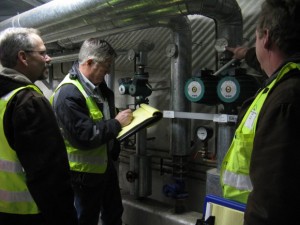Energy Efficiency Jobs
Energy engineers create the designs for energy efficient buildings and systems.
Energy engineers create the designs for energy efficient buildings and systems.
An energy engineer’s main focus is to discover opportunities for energy savings and make recommendations to achieve greater energy efficiency. These green job holders often travel to job sites to conduct observations, field inspections, or sub-metering to collect data for energy conservation analyses. Those with energy engineer jobs also perform energy audits to evaluate energy use, costs, and identify measures for energy conservation. Energy engineers monitor and analyze energy consumption of energy systems, including heating, ventilating, and air conditioning (HVAC) or lighting systems to determine energy use and calculate potential energy savings. Professionals with energy engineer jobs use the following tools and technology:
 Energy engineers also manage the design or construction features related to energy such as sustainable design, energy engineering and energy management. They perform energy modeling, measurement, verification, commissioning, or retro-commissioning to optimize energy performance. Energy engineers review architectural, mechanical, or electrical plans and specifications for energy efficiency and determine engineering feasibility. They also evaluate construction design information such as detail and assembly drawings, design calculations, system layouts and sketches, or specifications for energy efficiency. Based on their evaluation, energy engineers prepare project reports and other program or technical documentation. Finally, energy engineers train personnel or clients on topics such as energy management, provide recommendations regarding energy fuel selection, promote awareness or use of alternative or renewable energy sources. They also provide consultation with construction or renovation clients or other engineers on topics such as Leadership in Energy and Environmental Design (LEED) or Green Buildings.
Energy engineers also manage the design or construction features related to energy such as sustainable design, energy engineering and energy management. They perform energy modeling, measurement, verification, commissioning, or retro-commissioning to optimize energy performance. Energy engineers review architectural, mechanical, or electrical plans and specifications for energy efficiency and determine engineering feasibility. They also evaluate construction design information such as detail and assembly drawings, design calculations, system layouts and sketches, or specifications for energy efficiency. Based on their evaluation, energy engineers prepare project reports and other program or technical documentation. Finally, energy engineers train personnel or clients on topics such as energy management, provide recommendations regarding energy fuel selection, promote awareness or use of alternative or renewable energy sources. They also provide consultation with construction or renovation clients or other engineers on topics such as Leadership in Energy and Environmental Design (LEED) or Green Buildings.
Summary
Work Environment for Energy Engineers
Most energy engineers work in industrial plants, offices or labs. Some may work at construction or production sites, where they monitor or oversee projects or solve onsite problems. Many energy engineers travel to domestic plants or work sites.
Education, Training and Licensing
Obtaining a green job as an energy engineer typically requires a four-year bachelor’s degree. A considerable amount of work-related skill, knowledge, or experience in energy industry, power systems, electric and/or environmental engineering is needed to be considered qualified for energy engineer jobs. Regulatory background or experience as an expert witness would improve the chance of getting a job. Professional certification is a plus, but is not necessarily required. Employees in this job usually need several years of work-related experience, on-the-job training, and/or vocational training. This job usually involves coordinating, supervising, managing, or training others. Energy engineers can specialize in electrical systems; heating, ventilation, and air-conditioning (HVAC) systems; green buildings; lighting; air quality; or energy procurement.
Employment Figures, Projections, Outlook and Earnings
The BLS indicates a bright outlook for energy engineer jobs and expects employment in this field to grow between 3 percent and 9 percent from 2010 until 2020; this is slower than the average for all jobs. The Bureau of Labor Statistics (BLS) projected 44,800 job openings between 2010 and 2020, and noted 157,000 energy engineer jobs are currently filled. Titles included Energy Efficiency Engineer, Energy Manager, Distributed Generation Project Manager, Energy Engineer, Environmental Solutions Engineer, Industrial Energy Engineer, Measurement and Verification Engineer, Test and Balance Engineer. The BLS further reports that the median annual wage for salaried energy auditors was $90,580 with median hourly wage of $44.55.